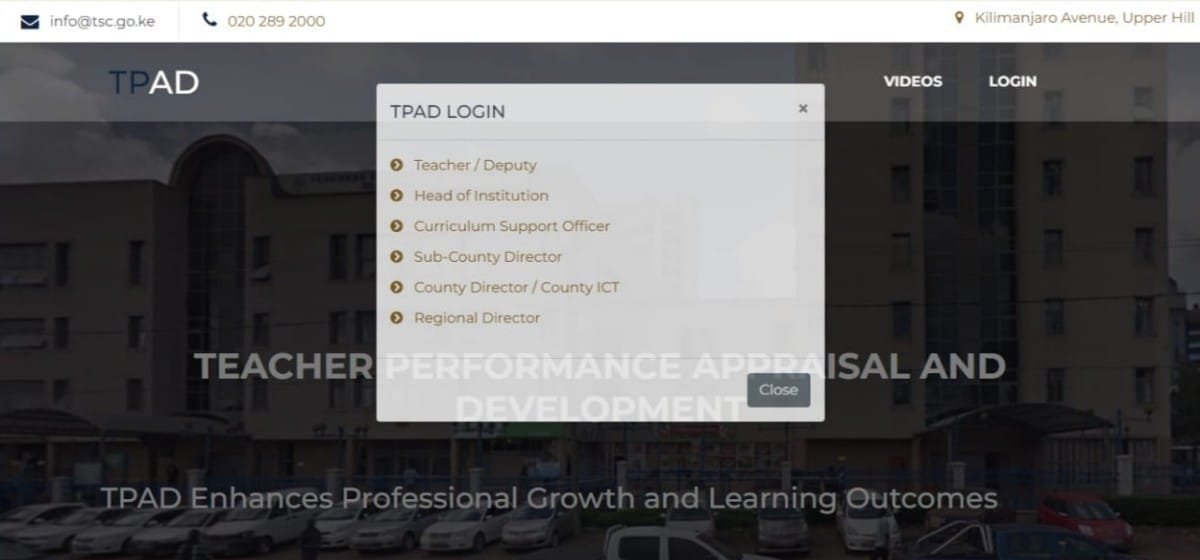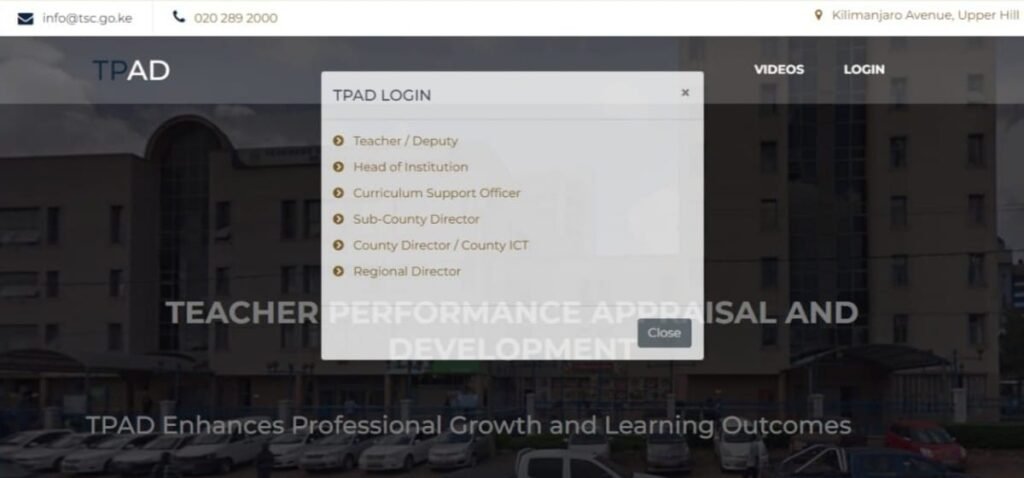Understanding the Online Teacher Performance Appraisal System in Kenya

A section of TPAD from TSC website

Introduction to the Online Teacher Performance Appraisal System
The Online Teacher Performance Appraisal System (TPAD) represents a significant advancement in the evaluation of educators in Kenya, implemented by the Teacher Service Commission (TSC). This modernized appraisal system serves the dual purpose of enhancing teacher accountability and ensuring transparency within the educational framework. Traditional methods of teacher evaluation often encompassed manual processes that were not only time-consuming but also lacked the efficiency required for meaningful appraisals. TPAD shifts this paradigm by introducing a digital platform that streamlines the evaluation process.
At its core, the TPAD aims to align with the country’s education standards, focusing on improving teaching effectiveness, classroom management, and ultimately, learner outcomes. By utilizing this online appraisal system, the TSC is better positioned to assess teacher conduct and performance through a standardized tool, which is vital for maintaining high educational standards across the nation. This system facilitates data-driven decision-making, allowing evaluators to compile and analyze feedback efficiently, thus enhancing the credibility of the appraisal process.
Additionally, TPAD is instrumental in identifying areas for professional development, catering to personal growth among educators. By utilizing the appraisal form within the system, teachers can receive targeted feedback that informs their teaching practices and helps in addressing specific challenges encountered in the educational landscape. Moreover, the integration of technology in education underscores the significance of adapting to policy changes that promote effective teacher motivation and engagement.
In essence, the Online Teacher Performance Appraisal System is a vital tool in modernizing teacher evaluations in Kenya, marking a pivotal shift from conventional methods to an innovative, transparent, and efficient appraisal framework. This approach not only holds educators accountable but also seeks to foster an environment conducive to continuous professional growth within the teaching community.
Key Features of TPAD

The Teacher Performance Appraisal and Development (TPAD) system in Kenya is specifically designed to enhance teacher accountability and transparency within the education sector. One of the most significant aspects of the TPAD is its digital interface, which allows teachers to participate in the appraisal process online. This shift to an online appraisal system not only simplifies the submission of appraisal forms but also promotes accessibility, enabling teachers to engage irrespective of their geographical location. The user-friendly platform facilitates real-time feedback and interaction between teachers and evaluators, which is essential for professional development.
Another crucial feature of the TPAD is the variety of appraisal forms available. These forms incorporate several performance metrics, allowing for personalized evaluations that reflect individual teaching practices. The appraisal forms are designed based on robust key performance indicators (KPIs) that focus on areas such as classroom management, teaching effectiveness, and learner outcomes. This systematic approach ensures that the evaluation process is comprehensive and data-driven, which aids in informed decision-making regarding teacher performance and educational standards.
The system also emphasizes continuous professional growth through its structured evaluation processes. By integrating periodic assessments, TPAD allows educators to receive constructive feedback, cultivate teaching effectiveness, and enhance their overall performance. Furthermore, the curated KPIs serve as guides for teachers to set improvement goals, thereby motivating them to enhance their instructional strategies consistently. Despite existing challenges, such as the need for broader technology adoption within education, the TPAD presents an innovative solution to addressing teacher conduct and accountability. Ultimately, these key features contribute to a robust framework that aims to elevate the quality of education in Kenya through improved teacher performance appraisal.
Benefits of the TPAD for Teachers

The Teacher Performance Appraisal and Development (TPAD) system in Kenya is designed to enhance the overall effectiveness of teaching by providing a framework that encourages accountability and transparency. One of the primary benefits of the TPAD is its capacity to improve the efficiency of completing appraisals. Teachers can easily access the online appraisal system, which streamlines the entire process of teacher evaluation. This efficiency minimizes the paperwork and administrative burden that often accompanies traditional appraisal methods, allowing educators to focus on classroom management and improving learner outcomes.
Moreover, the TPAD promotes data-driven decision-making within educational institutions. By utilizing the online appraisal system, teachers and educational leaders can collect and analyze relevant data related to teacher conduct and effectiveness. This approach not only enhances accountability but also facilitates informed strategies for professional development. With the insights gained from the appraisal process, teachers can better understand their strengths and areas for improvement, leading to targeted professional growth opportunities.
Another significant advantage of the TPAD is the motivational impact of receiving timely and constructive feedback. Regular appraisals allow teachers to gauge their performance relative to established education standards, promoting a culture of continuous improvement. Positive reinforcement coupled with actionable feedback fosters teacher motivation and engagement, which ultimately translates into improved teaching effectiveness. As educators witness tangible progress in their professional journey through the TPAD, they become increasingly committed to enhancing their teaching practices and, consequently, student learning experiences.
In conclusion, the TPAD system stands as a vital tool in the Kenyan educational landscape, providing multifaceted benefits that significantly enhance teacher performance. From improving the efficiency of appraisals to fostering professional development, the TPAD not only supports teachers in their roles but also contributes positively to the educational outcomes of learners across the nation.
Challenges Facing the TPAD Implementation

The Teacher Performance Appraisal System (TPAD) has been introduced in Kenya to enhance teacher accountability and improve teaching effectiveness across educational institutions. While the online appraisal system aims to streamline the teacher evaluation process, several challenges hinder its successful implementation. One prevalent issue is the technical difficulties experienced by users, which can significantly disrupt the appraisal process. Many educators report difficulties in navigating the online platform, often encountering system errors or slow internet connectivity. Such challenges not only frustrate teachers but also impede the timely completion of the appraisal forms, affecting classroom management and overall teaching quality.
Additionally, despite the advancements offered by the digital platform, excessive paperwork continues to plague the appraisal process. Teachers often find themselves juggling both online submissions and physical documents, creating redundancy that undermines the efficiency intended by the TPAD. This dichotomy leads to confusion regarding documentation requirements, resulting in a cumbersome workload that detracts from teachers’ primary focus on improving learner outcomes. The struggle with managing paperwork can also diminish teacher motivation, as educators may feel overwhelmed and undervalued in their roles.
Comprehensive training for educators is crucial for the success of the TPAD. Many teachers lack familiarity with the system’s functionalities, illustrating a need for policy changes that prioritize professional development in digital skills and technology in education. Without adequate training, teachers may misuse the platform, contributing to inaccurate data that hinders effective data-driven decision-making and compromises the integrity of teacher conduct evaluations. Addressing these challenges through targeted professional development and infrastructural improvements is essential to ensure that the Teacher Performance Appraisal System achieves its intended goals of promoting high educational standards in Kenya.
Impact on Teaching Standards in Kenya
The Teacher Performance Appraisal System (TPAD) has emerged as a pivotal tool in enhancing teaching standards across Kenya. By fostering a culture of accountability and transparency, this system has significantly influenced teacher conduct, motivating educators to adhere to established education standards. The TPAD facilitates regular teacher evaluation, promoting a mechanism that not only assesses performance but also encourages professional development.
Through data-driven decision-making, the TPAD enables educational stakeholders, including the Teachers Service Commission (TSC), to identify areas where teachers excel and where they may need support. This systematic approach to appraisal helps in setting clear expectations, pushing educators towards improved classroom management and teaching effectiveness. As teachers become more engaged in their professional growth, learner outcomes tend to improve, reflecting the positive impact of the appraisal system on students’ academic achievements.
Moreover, the implementation of online appraisal processes has streamlined the evaluation procedures, making it easier for teachers to showcase their competencies and development areas. This technological advancement not only speeds up the appraisal process but also creates a more transparent environment where teachers can monitor their progress over time. The interactive nature of the TPAD encourages an ongoing dialogue about performance and expectations, facilitating continuous improvement in teaching practices.
Real-world examples further illustrate the positive outcomes associated with the TPAD. Several schools have reported notable increases in teacher motivation and accountability, as a result of regularly scheduled performance reviews. As educators engage more deeply with the appraisal form and receive constructive feedback, they feel empowered to enhance their teaching strategies, thus positively influencing educational standards across the board.
In conclusion, the Teacher Performance Appraisal System has not only recognized and elevated professional teaching standards in Kenya but has also fostered a culture where accountability and ongoing professional development are fundamental to the educational process.
Teacher Feedback and Experiences with TPAD
The Teacher Performance Appraisal Development (TPAD) system in Kenya has elicited a range of feedback from educators who have directly engaged with its online appraisal processes. Many teachers appreciate the platform for its attempt to enhance teacher accountability and transparency. The system has made it easier for educators to track their performance over time, leading to more informed discussions about professional development. One teacher remarked that the TPAD has allowed them to better understand their strengths and areas for improvement in classroom management, thereby directly influencing their teaching effectiveness and learner outcomes.
Despite the positive feedback, various challenges associated with the TPAD have been highlighted. Many teachers have expressed concerns regarding the usability of the online platform, noting that it may not be user-friendly for everyone, particularly those who are less technologically adept. Some educators have reported frequent technical glitches that disrupt the appraisal process, which raises questions about the reliability of technology in education. Furthermore, teachers have pointed out that the appraisal form could benefit from a more streamlined approach, eliminating redundancies that complicate the evaluation process.
Suggestions for improvement have been abundant. A notable recommendation is the incorporation of more comprehensive training sessions that cover not just the functionality of the system, but also its purpose and impact on teacher conduct. Training could empower teachers to utilize the TPAD more effectively, promoting a data-driven decision-making culture that can enhance overall educational standards. Additionally, teachers have proposed the integration of peer reviews or collaborative assessments to supplement the evaluation mechanism, providing a broader perspective on teaching effectiveness.
Overall, the experiences shared by teachers using the TPAD reflect a strong desire for continuous improvement. Balancing the need for accountability with support for educators is crucial in realizing the full potential of this appraisal system.
Future of the TPAD: Potential Improvements and Technological Advancements
The Teacher Performance Appraisal and Development (TPAD) system in Kenya has brought significant shifts in how teacher evaluations are conducted, focusing on accountability, transparency, and professional development. However, to further enhance teaching effectiveness and learner outcomes, several potential improvements and technological advancements could be integrated into the existing framework.
One of the primary avenues for improvement lies in the incorporation of technology in education. With the rise of online appraisal platforms, the TPAD could leverage these advancements to streamline the appraisal process, making it more accessible and user-friendly for teachers. An online appraisal system would not only enhance data accuracy but also provide timely feedback that can be vital for teacher conduct and motivation. Utilizing a digital interface can facilitate data-driven decision-making, allowing educational stakeholders to analyze trends and address challenges promptly.
Furthermore, it’s crucial to seek feedback from teachers themselves, as they are the primary users of the TPAD. Gathering insights on their experiences with the appraisal form can guide necessary adjustments that address their needs while complying with the education standards set by the Teachers Service Commission (TSC). Many successful appraisal systems globally include teachers in the development process, ensuring that the evaluation criteria accurately reflect the realities of classroom management and professional growth.
Adapting global best practices from teacher performance appraisal systems can also yield benefits. For instance, integrating continuous professional development credits tied to appraisal outcomes can foster a culture of accountability and encourage teachers to engage actively in learning opportunities. These changes, bolstered by technological innovations, can create a more nuanced approach to teacher evaluation and development, ultimately leading to improved teaching effectiveness and enriched learner outcomes.
Conclusion: Embracing Change in Teacher Appraisal
As the educational landscape in Kenya continues to evolve, the implementation of the Teacher Performance Appraisal System (TPAD) signifies a pivotal shift towards enhancing teacher accountability and effectiveness. This online appraisal system, initiated by the Teachers Service Commission (TSC), aims to provide a structured framework for teacher evaluation that prioritizes transparency, professional development, and improved learner outcomes.
The primary objective of the TPAD is to ensure that education standards are upheld, ultimately leading to better classroom management and teaching effectiveness. By using a data-driven decision-making approach, the system enables the collection and analysis of critical information regarding teacher conduct and performance. This data is instrumental for educational leaders and policymakers alike as they navigate the complexities of teacher motivation and professional growth.
Moreover, the TPAD addresses the challenges inherent in traditional appraisal methods by leveraging technology in education. The online platform not only streamlines the appraisal process but also facilitates continuous feedback and support for educators. This modern approach encourages teachers to engage actively in their professional development, fostering an environment of learning and growth that is beneficial for both educators and students.
Embracing the changes brought about by the TPAD is essential for stakeholders in the Kenyan education system. The emphasis on teacher accountability and transparency cultivates a culture of respect and responsibility among educators. It is crucial for teachers, school administrators, and policymakers to work collaboratively, ensuring that the appraisal system serves its purpose effectively and contributes positively to the overall quality of education in the country.
In summary, the Teacher Performance Appraisal System not only reformulates how teacher evaluation is conducted but also pledges to uplift the standards of education in Kenya. By investing in this progressive system, we pave the way for a brighter future in teaching and learning.
Call to Action: Engaging Stakeholders in the TPAD Process
The Teacher Performance Appraisal System (TPAD) in Kenya represents a vital tool for enhancing teacher accountability and transparency within the education sector. As we embark on this journey towards improving teaching effectiveness, it is imperative that various stakeholders engage actively in this process. Policymakers, educational institutions, and teacher communities must collaborate to ensure that the appraisals conducted are not only effective but also responsive to the unique challenges faced in the educational landscape.
Engagement from policymakers is crucial. They must create a supportive environment that fosters professional development and encourages the implementation of the teacher performance appraisal system. Through policy changes that promote best practices in teacher evaluation, stakeholders can bolster classroom management strategies that ultimately enhance learner outcomes. This collaboration will empower teachers, ensuring they have the resources needed to thrive in their roles.
Educational institutions also play a pivotal role in the TPAD process. They should proactively adopt technology in education to facilitate the online appraisal system. By integrating data-driven decision-making into their evaluation processes, schools can better assess and respond to the needs of their teaching staff. An emphasis on continuous feedback and support for teachers will cultivate a culture of accountability that remains focused on educational standards and improvement.
Moreover, teacher communities must take charge of their own professional growth by actively participating in the appraisal process. By providing constructive feedback and engaging in discussions regarding the appraisal form, teachers can help shape a system that truly reflects their contributions and challenges. This communal approach not only fosters mutual support but strengthens the overall educational framework in Kenya.
In conclusion, the active engagement of all stakeholders in the TPAD process is essential for addressing challenges and improving the system. When educators, policymakers, and institutions work together, they create a more robust educational environment that ultimately benefits both teachers and students in Kenya.






